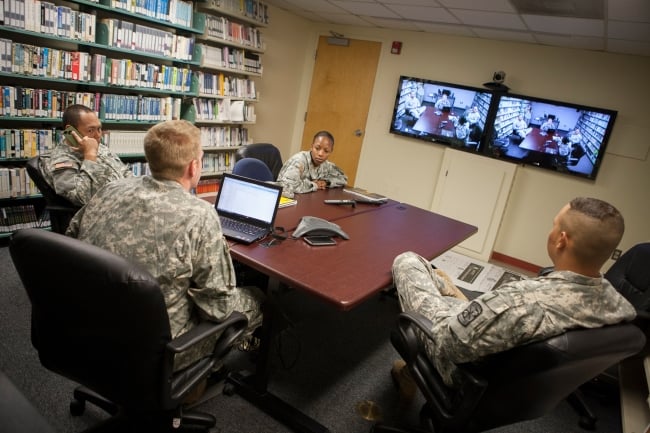You have /5 articles left.
Sign up for a free account or log in.

Many Saint Leo University students are distance learners in the military.
Saint Leo University
Hundreds of college programs that enroll military service members and veterans have gone years without adequate oversight to determine if they are delivering quality education, according to a recent audit by the U.S. Department of Veterans Affairs Office of Inspector General. As a result, more than $1.54 million in federal tuition and fee payments have gone to "ineligible or potentially ineligible" colleges participating in the Post-9/11 GI Bill program.
The colleges were part of a statistical sample of education programs reviewed as part of the audit, which "estimated that the risk of improper payments was particularly high at for-profit schools." The audit found that for-profit institutions received $1.5 million of the improper payments.
The audit, which was released last month, reviewed the Veterans Benefits Administration's oversight of state agencies charged with ensuring the quality of education and training programs. The Veterans Benefits Administration, or VBA, is the agency within the Department of Veterans Affairs responsible for administering programs that provide financial and other assistance to veterans and their dependents. State approving agencies, or SAAs, work with the VA to ensure the educational quality of programs that receive GI Bill benefits.
The audit highlights internal disagreements and a weak partnership between the Veterans Benefits Administration and the state approving agencies that led to the improper payments.
“Because VBA and the SAAs lacked effective controls to ensure the proper review, approval and monitoring of programs, VBA could not provide reasonable assurance that Post-9/11 GI Bill benefits were paid to eligible schools and programs and that students received quality education and training,” the audit states.
The OIG review also determined that thousands of students who will enroll in the Post-9/11 GI Bill program over the next five years will attend more "ineligible or potentially ineligible programs due to inadequate oversight" by the Veterans Benefits Administration. The audit report estimated the VBA will issue an additional "$2.3 billion in related improper payments" if it does not improve oversight of state approving agencies and ensure they have effective monitoring procedures in place.
The VA did not respond to repeated requests for comment about the audit, but the VBA challenged the findings in a written response to the inspector general.
“VBA does not agree that there has been weak oversight and a lack of accountability for program oversight functions,” the response states.
The VBA questioned the audit's methodology and said it was biased toward for-profit schools, which only represent one in five institutions where students receive military benefits. Out of 70 institutions sampled in the audit, 50 were for-profits.
The VBA also disagreed with the audit's assessment that the relationship between the VBA and the SAAs is weak.
"This report does not accurately characterize this strong and effective partnership that has been in place for decades, nor does it accurately reflect the high quality of work performed by most SAAs and VBA employees in the realm of compliance and oversight," the response states.
The inspector general's report criticized the VBA's response and implied that it was disingenuous.
"The OIG views VBA's opposition to its findings and conclusions to be unconvincing," the report states. "VBA's response, which portrays most of its actions in laudatory terms with few admissions that improvements are needed, is disappointing given the acknowledgment in VBA's general comments that several areas needed improvement."
The inspector general agreed that VBA has taken action in some instances, but that "does not negate the fact that the audit identified systemic weaknesses in SAA program approval and monitoring," the audit report concluded. And those weaknesses undermined processes meant to protect 800,000 Post-9/11 GI Bill students enrolled in over 100,000 education and training programs.
The audit review covered the period from February 2015 through January 2016. During that time, 51 state approving agencies nationwide approved nearly 82,200 education programs that enrolled Post-9/11 GI Bill students.
The audit team randomly selected seven of the 51 state approving agencies and reviewed a statistical sample of 175 approved programs. The states selected were California, Mississippi, Nebraska, New Jersey, New Mexico, New York and Oregon. The audit found 35 programs approved by six of the seven state approving agencies had “unsupported or improper program approvals; missing or delayed program modification reporting and reviews; or potentially erroneous, deceptive, or misleading advertisements.”
As a result, "The audit team identified $1.54 million in improper Post-9/11 GI Bill tuition and fee payments made for just over 230 students enrolled in 35 of the 175 programs reviewed," the audit report states.
Programs were considered ineligible if the institutions didn't report any changes in their administrative operations or the courses they offered, or if they used deceptive or misleading advertisements. The six approving agencies also did not always conduct adequate reviews to ensure programs met legal requirements, according to the audit. Twenty-nine of the ineligible programs were at for-profit institutions that received $1.5 million in payments.
The audit report also estimated that 17,000 students who enroll in a GI Bill program within the next five years will attend more than 5,400 "ineligible or potentially ineligible programs" due to poor oversight.
Some veterans' advocacy groups were disappointed to hear that a large number of education and training programs were receiving GI Bill benefits without proper oversight.
“Students are not being protected from deceptive colleges, and the IG is asking why are we sending veterans to bad actor colleges,” said Carrie Wofford, president of Veterans Education Success, a group that works to improve veterans services and their college outcomes. “The schools don’t pay anything back. The students don’t, either, but taxpayers are getting ripped off.”
Despite the audit findings, Daniel Elkins, director of the Veterans Education Project, a nonprofit that also focuses on student veterans' needs, said the report doesn’t distinguish between those programs that don’t file the correct paperwork and those that have poor academic quality.
“We want to see this information disaggregated to know whether or not we need to move in a stronger regulatory environment for student protections or if we need to move in a strong way to reprogram what the state approving agencies are doing,” said Elkins, who is also legislative director of the Enlisted Association of the National Guard of the United States.
The audit does show that there are accountability and oversight issues, but Elkins said he is concerned about the bias against for-profit institutions.
The National Association of State Approving Agencies expressed concern about the lack of funding for the state agencies despite their heavy workloads. The organization also agreed with the audit's recommendation that the relationship between SAAs and the VA needs to improve.
“The inspector general mentions the concern with funding now, but we were not resourced to do as good a job as we could do,” Joseph Wescott, legislative consultant for the National Association of State Approving Agencies and former president of the organization. “We take seriously the challenges and concerns about oversight.”
Part of the problem is that the state agencies have taken on more responsibilities that were previously handled by the VA. For example, as part of its contract with the VA, the California State Approving Agency for Veterans Education is required to perform 151 compliance surveys this year. Those surveys are primarily federal fiscal audits that ensure payments are made correctly.
The state agencies began helping the VA conduct these surveys about eight years ago, Wescott said.
“The VA took us off mission and put us on audits,” he said. “Now the hope is that this year, by working with our partners at the VA, that will change.”
And the state approving agencies expect to receive an additional $2 million in funding from the VA this year, Wescott said.
“That’s what is exciting and challenging about this year, because it can’t be business as usual,” he said. “With the millions and billions of dollars being poured into the GI Bill … we have got to make sure that money is well spent. That’s the role of state approving agencies. We need to do that work on the front and we need to provide effective and proper oversight.”




